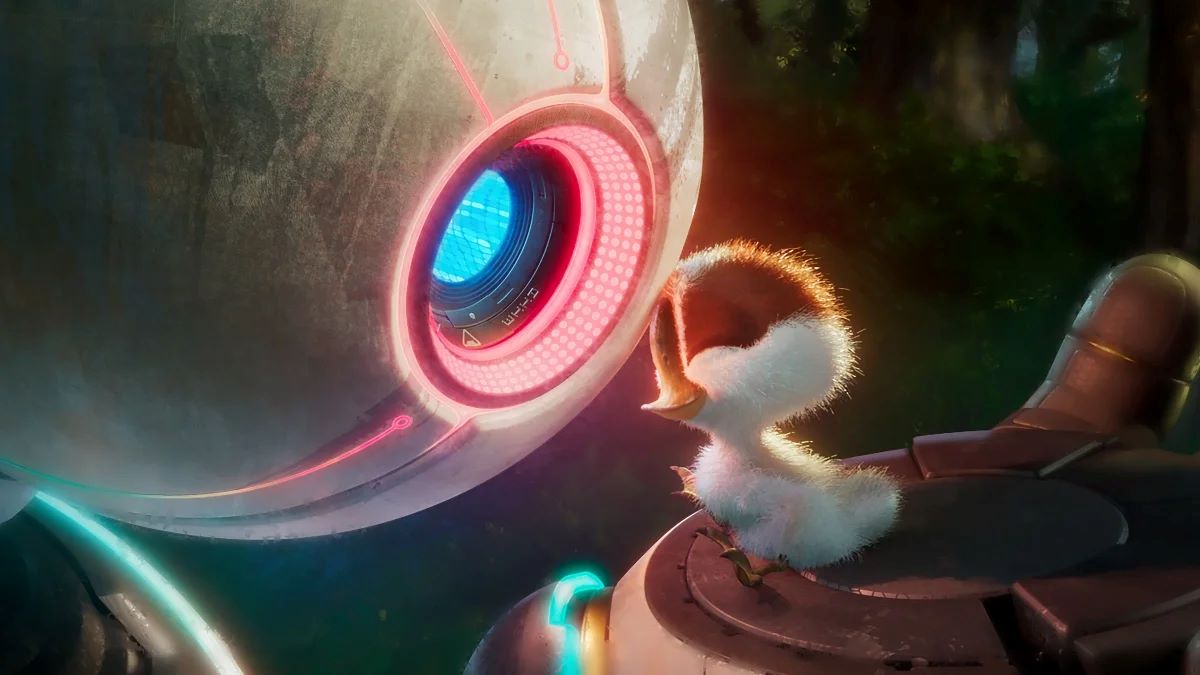Chris Sanders’ The Wild Robot is easily one of the most heartwarming films of the year. An AI’s accidental brush with motherhood opens up a conversation about just how truly “program-altering” being a mother can be. But what does it say about those who choose not to be mothers? A lot, methinks. A whole lot.
In The Wild Robot, we meet ROZZUM Unit 7134 (Lupita Nyong’o), a robot from Universal Dynamics that gets washed up on an island after a cargo ship is destroyed in the storm, activated by the curious wildlife that finds it. ROZZUM, later nicknamed Roz, accidentally destroys a goose nest, killing the mother and her babies, except one. Roz protects the egg from predators like the sly fox Fink (Pedro Pascal), and when the gosling hatches, he imprints on Roz, believing it to be his mother. As ROZZUM units are programmed to accomplish their task, Roz decides to help the gosling Brightbill (Kit Connor) learn to swim and fly before his winter migration, after which Roz would reactivate the homing signal that would alert the manufacturers of its location.

At a time when the threats posed by AI are being widely discovered, The Wild Robot arrives with a beautiful possibility—an emotion as powerful as motherhood can transform even a robot’s programming. Being a mother humanizes Roz. The film makes us realize something we already know—motherhood can alter the very core of one’s being. A woman’s programming undergoes drastic changes when she becomes a mom. It doesn’t matter if those changes are physical or emotional, she will never be the same.
Being a mother to Brightbill changes a robot trained to merely emulate and react to human behavior into someone who goes against its very nature to protect someone it considers its child. We see Roz make major sacrifices, sometimes at the cost of its well-being, to ensure that Brightbill is trained for the winter migration. We see instances of typical teen behavior from Brightbill as he briefly detests Roz for making him an outcast amongst his kind. Another poignant point the film makes is that a robot’s job is just as thankless as a mother’s. A ROZZUM wouldn’t care if its owners didn’t love it back, but Roz now has feelings; it cares.

In the process of raising Brightbill, Roz doesn’t just change emotionally but also physically. She loses a leg, rusts, marks a spot where Bill would rest his head on her neck when sleeping … Even her name and pronouns are changed—It is now a ‘she’ when we talk about her, and from ROZZUM with numbers in its name, she is now Roz, a beautiful name that screams “mom.”
In the end, no matter how much Universal Dynamics tries to revert Roz’s programming, there’s no going back. Her heart and personality have been changed irrevocably.
While The Wild Robot reveres motherhood with its moving story, as someone who hasn’t seriously considered motherhood or doesn’t quite see herself as a mother, I couldn’t help thinking about another statement the film makes. Perhaps, when you truly grasp its message about modified programming and how much Roz had to change to become a good mother to Brightbill, The Wild Robot empathizes with those women who do not want to be mothers as well.
As Roz soon realizes, motherhood isn’t something you can take lightly; a living, breathing life depends on you for survival. We find out that Brightbill is a runt, and that, had it not been for Roz, he wouldn’t have survived for long on his own. Every day for this little gosling was a struggle, in a jungle full of dangers and predators. To ensure he didn’t just survive but also thrived, Roz had to fully commit to the cause of raising him. Even as we talk about motherhood humanizing Roz, there’s a point to be made about how it took a robot’s unconditional and unwavering resolve, something literally programmed into her system, to stick to the task of raising Brightbill.
It isn’t just enough to choose to be a mother. You have to choose to be one every day and have the patience and resilience to commit to it. It’s not an easily accomplished task, especially if, like Roz, you are a single parent, helped only by friends like Fink. So then, is it a choice that every woman can lightly make? One that requires you to undergo nine months of your body changing, making you sick, not being able to take any medication because it might affect the baby, change your lifestyle, your clothes, your brain chemistry? The baby isn’t even born yet! What happens after the birth is a whole different story.

There are two lessons to learn from The Wild Robot. The obvious lesson is that motherhood is a great, beautiful emotion. But the second lesson is equally crucial: motherhood is not for everyone. It’s not just about whether every woman is capable of being a mother or not, it’s about choice. It’s about not wanting to “change your programming” so much that you become a whole different person, with changed life goals, and an entirely new plan for the future. It’s about not being sure whether you are ready for it, and not wanting to bring a child into the world when you’re not mentally equipped to take on the responsibility. It is about respecting that choice and understanding that parenthood is a scary prospect for some and that it’s okay if they’re not eager to jump into it.
Roz turned out to be a great mom. But that doesn’t mean all the AI robots in her batch would also turn out the same if they were put in a similar situation. Pinktail the opossum (Catherine O’Hara) was a different kind of mom to her babies. And Fink the fox, now having watched Roz raise Brightbill, might not go on to become a great parent, ever. Fink was the fun uncle to Brightbill and he can choose to remain that way. No pressure!









Published: Oct 27, 2024 10:47 am